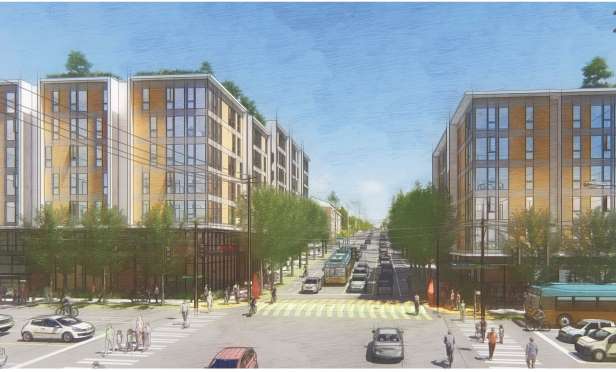 The Maddux is a 166-unit affordable housing project located in the Mt. Baker neighborhood.
The Maddux is a 166-unit affordable housing project located in the Mt. Baker neighborhood.
SEATTLE—Situated on a site formerly occupied by gas station and dry cleaner, The Maddux represents a first-of-its-kind partnership between nonprofit and affordable housing developer, Mt. Baker Housing, and the Washington State department of ecology. The department of ecology provided $400,000 to Mt. Baker Housing to start the cleanup process last year as the developer uses the funds to clean up onsite contamination left by the previous tenants on the site.
The legislature authorized another $6.2 million to complete the cleanup work for the project and the ecology department also provided funding to Mt. Baker Housing this past summer. The funds from Seattle's Office of Housing will bridge the final gap to move the project forward.
The Maddux is a 166-unit affordable housing project located in the Mt. Baker neighborhood. The Seattle housing levy funds, created to further affordable housing for the city's most vulnerable and lower-income residents, will help construct the two-building multifamily affordable housing project located on South McClellan Street on the east side of Martin Luther King Jr. Way South in the transit-oriented development site within Mt. Baker Town Center.
“This funding from the city is critical to our ability to build affordable housing in Seattle,” said Mike Rooney, executive director at Mt. Baker Housing. “We are focused on ensuring that all people regardless of income have a secure, affordable place to live. These funds are the all-important last piece to the funding puzzle, and now we are officially on our way.”
Construction on The Maddux is tentatively slated to begin early 2020, with completion by the late spring of 2021. Located within blocks of the Mt. Baker light rail transit station, all new homes at The Maddux will be affordable to those earning 60% of area median income or less and includes studios, one-, two- and three-bedroom apartment homes. Nearly 35% of the homes will be two- or three-bedroom family-sized affordable housing.
“Maximizing opportunities for affordable housing near transit lines is essential in Seattle,” Rooney tells GlobeSt.com. “Sites like The Maddux are hard to come by and we could not have made this happen without the city's funding.”
With a focus on preserving the affordability of future housing and community facilities along transit corridors, The Maddux will also be a good demonstration of many of the principles within Mt. Baker Housing's equitable development strategy. The project also plans to utilize new zoning stemming from the city's mandatory housing affordability rezones and will include onsite mandatory housing affordability units.
The current project team includes Aspect Consulting (environmental), Perkins Coie (environmental), Impact Capital (acquisition lender), Mithun (architect) and Beacon Development Group (development consultant). The team has not yet selected a general contractor.
Mt. Baker Housing has nine affordable apartment projects in Seattle. Additional projects include the 156-unit Mt. Baker Village (Mt. Baker), 80-unit scattered sites (Rainier Valley), 35-unit Arbor Woods (Skyway), 30-unit Starliter Apartments (Rainier Beach), 26-unit Crestwood Place (Rainier Valley), the 60-unit Link (Mt. Baker), the 203-unit Beach Square (Rainier Beach) and the 200-unit Grand Street Commons project (Judkins Park). Previously, Mt. Baker Housing received funds from Seattle's office of housing for its Link Studios project.
Affordable housing remains out of reach for many Washingtonians, particularly those with the lowest incomes, according to the Washington Low-Income Housing Alliance. Some 289,615 households in Washington State who earn less than half the median income spend more than half their incomes for housing. For every 100 households earning less than 30% of area median income, there are only 28 rental homes that are affordable and available to those renters.
© Touchpoint Markets, All Rights Reserved. Request academic re-use from www.copyright.com. All other uses, submit a request to [email protected]. For more inforrmation visit Asset & Logo Licensing.







